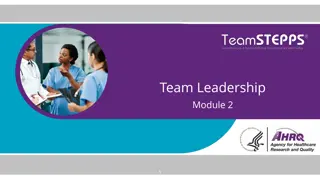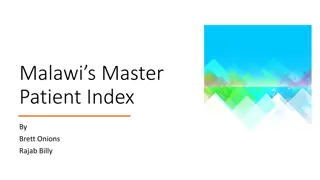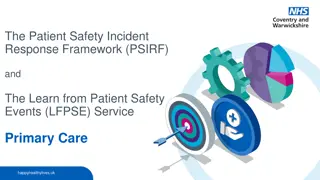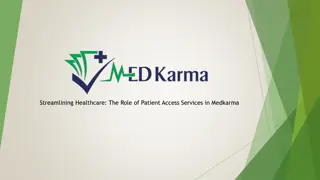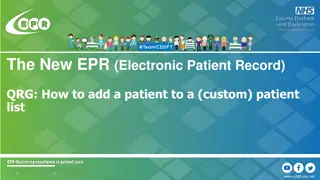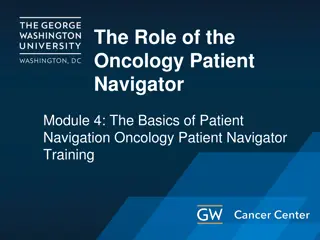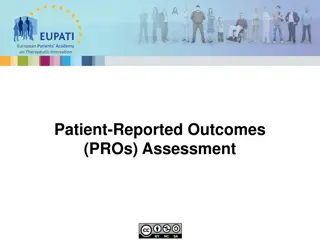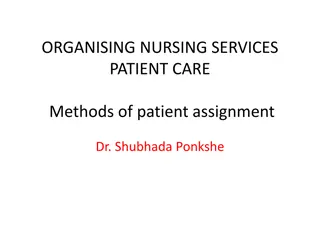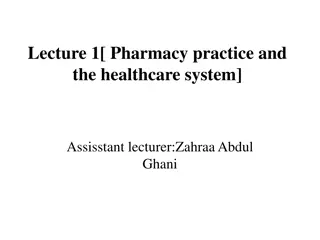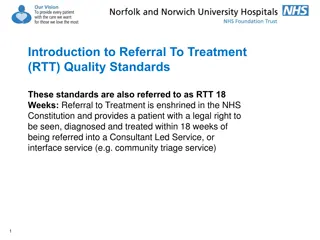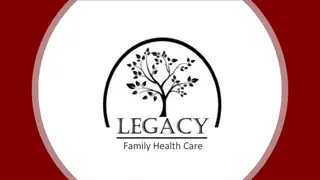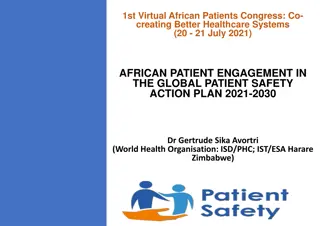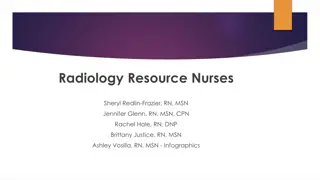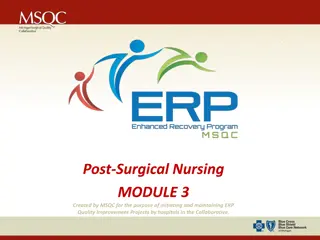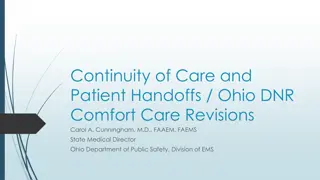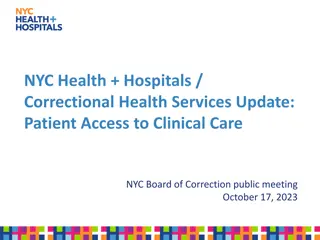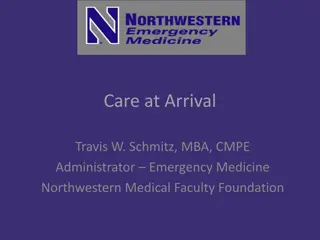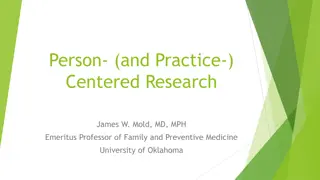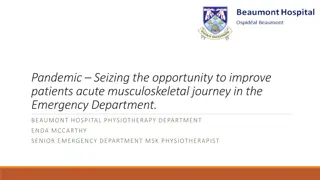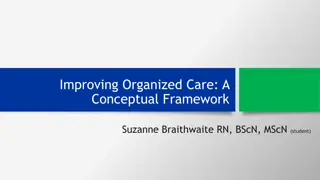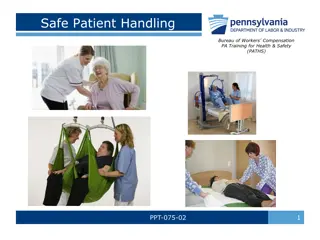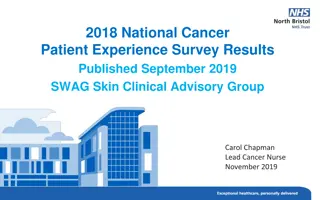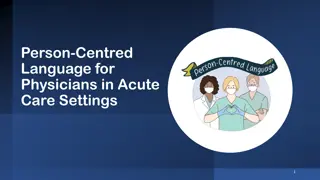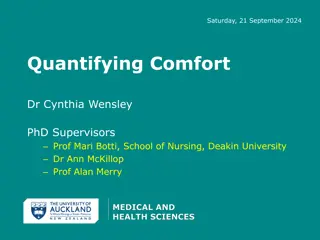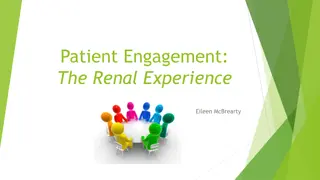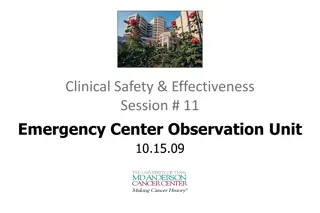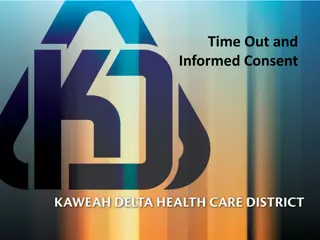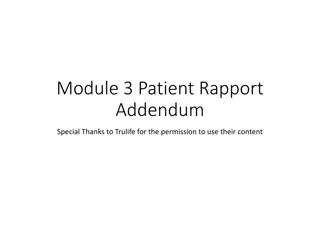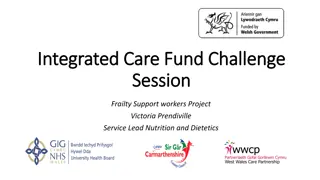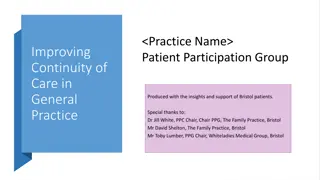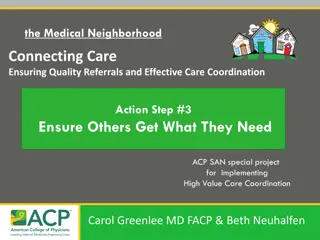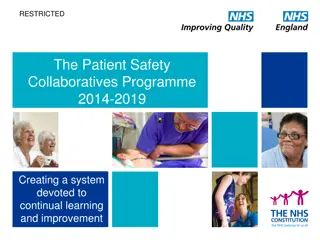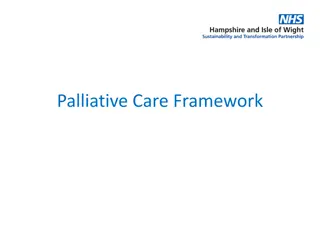Modernize Patient Experience with Digital Patient Conversion Platform
Enhance patient relationships and streamline your practice with a secure digital patient conversion platform. Acquire new patients online, modernize patient experience, retain existing patients, and optimize technology investments. Utilize tools like online booking, digital check-in, and workflow au
0 views • 31 slides
Effective Team Leadership for Patient Care Collaboration 2.Summary: Understanding the importance of teamwork structures, roles, and interactions within healthcare settings is crucial for successful patient care. This module highlights the benefits o
Team Leadership, Patient Care, Healthcare Teams, Collaboration, Patient Engagement
1 views • 38 slides
Understanding the Patient Safety Incident Response Framework (PSIRF)
The Patient Safety Incident Response Framework (PSIRF) is set to replace the Serious Incident Framework (2015) within the NHS, marking a significant shift in responding to patient safety incidents. Its key aims include compassionate engagement, system-based learning, proportionate responses, and sup
5 views • 9 slides
Enhancing Healthcare Services in Malawi through the Master Patient Index (MPI)
The Master Patient Index (MPI) plays a crucial role in Malawi's healthcare system by providing a national patient identification system to improve healthcare quality and treatment accuracy. Leveraging the MPI aims to dispense unique patient IDs, connect with existing registries, enhance data managem
4 views • 8 slides
Rwanda HIE Patient Identity Management System Overview
The Rwanda Health Information Exchange (HIE) system focuses on patient identity management to uniquely identify individuals seeking healthcare across the country. By maintaining a set of identifiers in the client registry and avoiding duplication of patient records, the system ensures efficient and
12 views • 8 slides
Enhancing Patient Safety in Primary Care: PSIRF and LFPSE Overview
The Patient Safety Incident Response Framework (PSIRF) and Learn from Patient Safety Events (LFPSE) aim to improve patient safety by providing a structured approach to incident response and analysis in primary care settings. PSIRF emphasizes compassionate engagement, learning from incidents, proport
3 views • 14 slides
Streamlining Healthcare, The Role of Patient Access Services in Medkarma
In the labyrinth of healthcare, where patient needs intersect with administrative procedures, lies a critical component often overlooked \u2013 Patient Access Services. In the realm of Medkarma, this integral function serves as the linchpin, orchestrating seamless transitions from patient inquiries
3 views • 8 slides
Quick MD Care_ Your Trusted Partner in Primary Care Medicine
Quick MD Care: Your Trusted Partner in Primary Care Medicine\n\nWelcome to Quick MD Care, where compassionate primary care meets convenience. We understand the importance of having a trusted partner in managing your health. Our team of dedicated primary care doctors is committed to providing persona
5 views • 2 slides
How to Add a Patient to a Custom Patient List in The New EPR
Learn step-by-step instructions on adding a patient to a custom patient list in The New EPR (Electronic Patient Record) system. Follow the detailed guide to efficiently manage patient data and create customized lists for easy access. Enhance your workflow with this quick reference guide.
0 views • 9 slides
Understanding the Role of Oncology Patient Navigators
This content delves into the essentials of patient navigation in oncology, covering competencies, professional roles, responsibilities, and functions of patient navigators. It highlights the importance of patient empowerment, communication, cultural competency, and care coordination. The material al
0 views • 43 slides
Understanding Patient-Reported Outcomes in Therapeutic Innovation
Patient-Reported Outcomes (PROs) are gaining importance in therapeutic innovation to capture how patients feel about their treatment beyond clinical effectiveness. The European Patients Academy emphasizes the significance of measuring PROs through tools like Patient-Reported Outcome Measures (PROMs)
0 views • 30 slides
Organising Nursing Services for Effective Patient Care
This content discusses methods of patient assignment, objectives of organising patient care units, factors influencing patient care quality, and considerations for organising patient care in wards. It emphasizes forecasting needs, professional activities, organizational activities, physical environm
0 views • 45 slides
Pharmacy Practice and Patient Care: A Comprehensive Overview
Pharmacy plays a vital role in patient care by contributing to health outcomes through management of medicines, chronic conditions, common ailments, promotion of healthy lifestyles, and support for healthcare professionals. Pharmacist interventions in the healthcare system ensure rational use of med
3 views • 14 slides
Understanding Referral to Treatment (RTT) Quality Standards
Referral to Treatment (RTT) Quality Standards, also known as RTT 18 Weeks, is a vital component of the NHS Constitution that guarantees patients a legal right to timely diagnosis and treatment within 18 weeks of referral. It encompasses various stages in a healthcare pathway, each assigned an RTT co
1 views • 12 slides
Revolutionizing Healthcare with Direct Primary Care
Direct Primary Care (DPC) is a cost-effective and patient-centric solution that provides high-quality healthcare services without the involvement of insurance plans or middlemen. With a focus on restoring the provider-patient relationship, DPC empowers patients to actively participate in their care
0 views • 13 slides
Enhancing Patient Safety: Global Action Plan 2021-2030
Patient safety is a critical aspect of healthcare with millions of adverse events occurring annually. The Global Patient Safety Action Plan (GPSAP) for 2021-2030 focuses on key areas such as policies for zero patient harm, high reliability systems, safety of clinical processes, patient and family en
0 views • 13 slides
Role of Radiology Resource Nurses in Healthcare
In November 2018, the need for Nursing Coverage in the Radiology Department led to the identification of the Role of Radiology Resource Nurses (RRN). These critical care-trained Registered Nurses act as clinical liaisons between patient care areas and the Radiology Department, ensuring continuity of
0 views • 21 slides
Enhanced Recovery Program Implementation in Post-Surgical Nursing
Introducing and implementing an Enhanced Recovery Program (ERP) in post-surgical nursing can significantly improve patient outcomes, experience, and satisfaction. This clinical pathway designed by MSQC aims to optimize patient recovery by standardizing protocols throughout the perioperative care pro
1 views • 26 slides
Enhancing Patient Handoffs and Continuity of Care in EMS Settings
This document discusses the critical aspects of patient handoffs and continuity of care in emergency medical services (EMS) settings. It highlights the challenges faced during patient transitions and emphasizes the importance of effective communication and collaboration between EMS providers and rec
0 views • 14 slides
Improving Patient Access to Clinical Care in NYC Correctional Health Services
NYC Health + Hospitals/Correctional Health Services (CHS) has implemented initiatives for patient access to clinical care. CHS offers both CHS-Initiated and Patient-Initiated access to medical appointments. The Patient-Initiated Health Triage Line (HTL) allows direct communication with nurses for no
1 views • 5 slides
Improving Emergency Department Patient Care with Care at Arrival Model
Emergency Medicine Administrator Travis W. Schmitz introduces the innovative Care at Arrival approach to enhance patient care in the emergency department. The model focuses on providing immediate treatment upon patient arrival to reduce wait times, increase patient satisfaction, and improve operatio
0 views • 12 slides
Understanding Person-Centered Care in Healthcare Research
Explore the concepts of person-centered care in healthcare research, focusing on key differences from problem-oriented care, emerging research questions, methodological considerations, and implications for study populations, interventions, and outcomes. Learn about the definition of patient-centered
2 views • 52 slides
Enhancing Acute Musculoskeletal Patient Care in Beaumont ED
Beaumont Hospital's Physiotherapy Department, led by Senior MSK Physiotherapist Enda McCarthy, has seized the opportunity during the pandemic to improve the acute musculoskeletal journey of patients in the Emergency Department. By implementing a service development strategy focusing on assessing and
0 views • 4 slides
Understanding Organized Care in Primary Care Settings
Organized Care refers to a natural community of caregivers with a shared commitment to proactive population and individual care management. Through effective and efficient practices, it serves the needs of patients across various settings and over time, with aligned goals and provider accountability
0 views • 18 slides
Ensuring Safe Patient Handling in Healthcare Settings
This presentation discusses the risks of musculoskeletal injuries in healthcare due to manual patient handling, emphasizing the importance of proper techniques and patient lift equipment. It highlights rising challenges such as obesity rates, an aging workforce, and workforce shortages contributing
0 views • 47 slides
National Cancer Patient Experience Survey 2018: SWAG Skin Results Summary
SWAG received high ratings for overall cancer care and skin care in the 2018 National Cancer Patient Experience Survey. Patients reported improvements in overall care, access to support, and involvement in decision-making. However, there was a decline in scores related to waiting times for appointme
0 views • 6 slides
Lessons from Winterbourne View Hospital: Failures in Patient Care
Winterbourne View Hospital exposed serious issues of neglect, abuse, and regulatory failures in patient care. The hospital ignored patient complaints, lacked accountability, and failed to address concerns raised by a whistleblower. Regulatory inspections were ineffective, and compliance with standar
0 views • 13 slides
Enhancing Communication in Acute Care: Person-Centred Language for Physicians
Person-Centred Language (PCL) plays a crucial role in acute care settings, influencing patient-provider interactions and care outcomes. This approach emphasizes respect, specificity, and objectivity in communication, enhancing patient satisfaction and engagement. By using language that is respectful
0 views • 15 slides
Enhancing Patient-Centered Care Through Improved CMC Records at The Hillingdon Hospitals NHS Foundation Trust
The Hillingdon Hospitals Trust aims to enhance patient-centered care by improving visibility and awareness of CMC (Coordinate My Care) records across generic teams through the development of specific patient information resources, tracking patient attendance at ED with CMC records, and optimizing th
0 views • 11 slides
Quantifying Comfort in Healthcare: A Framework for Enhancing Patient Experience
Patient experience in healthcare is greatly influenced by the level of comfort provided during care. However, the concept of comfort has been poorly defined in practice. This study by Dr. Cynthia Wensley and team aims to quantify and enhance comfort in healthcare settings. Through a two-stage qualit
0 views • 5 slides
Enhancing Patient Engagement in Renal Care at Beaumont Hospital
Patient engagement in renal care at Beaumont Hospital focuses on promoting person-centered care and empowering patients to manage their health. This initiative aims to improve patient outcomes, enhance staff listening skills, and involve patients in all levels of healthcare organizations. By listeni
0 views • 27 slides
Improving Patient Care and Safety in the Emergency Center Observation Unit
The project aims to enhance patient care and safety in the Emergency Center by reducing the length of stay, which currently averages 9.5 hours, affecting patient care and safety. The team led by Dr. Patrick Chafitari and Dr. Jean Tayar explores solutions to optimize patient outcomes, satisfaction, a
0 views • 37 slides
Importance of Time Out and Informed Consent in Patient Care
Time Out and Informed Consent are crucial components of quality care and patient safety, aimed at preventing wrong-sided or wrong procedures. Time Out involves stopping all activities, positively identifying the patient, and confirming procedure details before proceeding. Informed Consent is a discu
0 views • 5 slides
Techniques for Building Patient Rapport in O&P Clinics
Explore essential terminology and techniques for enhancing patient rapport in orthotics and prosthetics (O&P) clinics. Learn about treatment planning based on patient diagnosis and assessments, conducting effective patient interviews, and engaging patients through communication strategies. Discover
1 views • 48 slides
Improving Patient Outcomes through Frailty Support Project
This project, funded by the Carmarthenshire Intermediate Care Fund, aimed to provide flexible, person-centered care to support patient mobility and nutritional needs. Frailty workers implemented various strategies such as frailty snack boxes, daily frailty logs, grip strength assessments, and nutrit
0 views • 8 slides
Enhancing Patient Care Through Continuity in General Practice
Continuity of care in general practice is crucial for improving patient outcomes and experiences. Maintaining a consistent relationship with a GP or healthcare team leads to better medical adherence, enhanced doctor-patient relationships, reduced hospital visits, and overall improved health outcomes
0 views • 15 slides
Enhancing Care Coordination for Improved Patient Referral Experiences
Explore the importance of patient-centered referral experiences, highlighting the impact of effective care coordination on patient outcomes. Contrasting cases illustrate the difference between non-patient-centered and patient-centered referral processes. Learn actionable steps to ensure all stakehol
0 views • 52 slides
ePAG Steering Committee Governance Update Summary
The ePAG Steering Committee is working on governance aspects and templates for ePAGs, focusing on patient engagement and transparency. The committee aims to establish clear requirements for patient organizations, formalize relationships between ERNs and patient organizations, and integrate rules for
0 views • 10 slides
Creating a System Devoted to Continual Learning and Improvement in Patient Safety Collaboratives Programme
The Patient Safety Collaboratives Programme from 2014-2019 emphasizes continual learning and improvement in patient care within the NHS. The focus is on placing patient care quality above all, engaging patients and carers, developing staff abilities, and fostering transparency for accountability and
0 views • 9 slides
Comprehensive Palliative Care Framework and COVID-19 Admission Decision Pathway
This content provides detailed information on a Palliative Care Framework and a COVID-19 Admission Decision Pathway, covering care plans, support for vulnerable patients, decision-making processes, treatment options, and community palliative care during COVID-19. It outlines steps for patient care i
0 views • 4 slides

